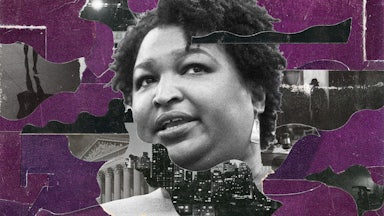In the early 2000s, before the levees broke in New Orleans, it was still possible to be a provincial New Englander and drive in a shiny rental car down Interstate 45 toward Galveston, Texas, without feeling anything except a profound appreciation for the beauty glistening off the West Bay in the sun. Galveston is one of those seaports that can make you stop in your tracks as you consume its beauty, even as Barack Obama’s 2008 election brought long simmering white resentment to a boil beneath flapping DON’T TREAD ON ME banners and Confederate-flag–stamped golf carts in the West End. The smell of the ocean can almost make you forget that Texas, the vast landscape to which Galveston attaches, is a place where you had the best homemade tamales from a pregnant Mexican woman outside of Marfa mere days after you were called the N-word for only the second time in your life. The woman who said it, smiling and blonde, did so in the middle of a fancy restaurant near the University of Texas at Austin campus, as a white couple, friends of your ex-husband, pretended that they didn’t hear. As an elitist Masshole, you find it easy to fall back on tired stereotypes when you think about this Texas that you tried so hard to love, a muggy place peopled by caricatures of tobacco-chewing, bigoted white men and bearded libertarian food truck proprietors.

And then you realize that the thing everyone says about Texas—that it is “the most racist place” in the country—is also what people say about any place in America where the anti-Blackness is less familiar to them than the white supremacy that they are used to. You also remember the older relative who laughed when you said such and such a place was “the most racist”—“that’s like saying one body of water is wetter than another,” they scoffed, “and then fighting over who is right.” And you think how easy it is to be so shallow about an American story that has so much depth.

Galveston might be part of Texas, a state that self-righteous Northern liberals would find easy enough to mock even if Ted Cruz didn’t exist, but it is also the birthplace of Juneteenth, the African American holiday more enduring than the free Black celebrations of West Indian emancipation that preceded it. Once the capital of the Republic of Texas, Galveston was home to nearly 2,000 enslaved people in 1860, although hundreds more newly freed people migrated to the city in the years after the Civil War. Like many remote areas of the Confederacy, Texas was slow to respond to the war’s end—the Army of the Trans-Mississippi did not officially surrender until June 2, and it wasn’t until over two weeks later, on June 19, 1865, that Union Maj. Gen. Gordon Granger read “General Order No. 3,” which formally enacted the Emancipation Proclamation across the state. As such, Galveston, once home to the largest slave-trading port west of New Orleans, was also the spot where the last group of enslaved people in the United States heard a formal announcement that nearly 250 years of slavery on North American soil was over. Many of them called the day Jubilee, a term used in the Book of Leviticus to describe the moment at which Hebrew slaves and prisoners were freed in the land of Israel. In December 1865, the Thirteenth Amendment to the Constitution finally ended slavery in the United States—with the exception of “punishment for a crime”—and freedpeople in Galveston held the first Juneteenth six months later in 1866 to commemorate what they recognized as the official day of Jubilee.
This is the origin of Juneteenth, which has gained recent popular attention after white Americans responded to last summer’s mass protest movement in the most American way possible—through token gestures of “historical reckoning” rather than actual atonement through, say, restoration of Section 4b of the 1965 Voting Rights Act. A large corporation asked me to participate in one such token gesture, despite the fact that my scholarship is not concerned (narrowly speaking, at least) with Texas or Galveston or the history of African American emancipation celebrations. But I obliged partly because, in the midst of Covid, I worried that members of my family would run out of money, and the gig seemed like an easy way to ensure that didn’t happen. After I delivered what was probably a lackluster Zoom presentation to hundreds of mostly bored middle managers in a quarantine-induced haze of PowerPoint slides and Du Bois quotes, a private question from an audience member confirmed what I already knew—that we as a country are ill-equipped to deal with our so-called moment of racial reckoning because we are so ill-prepared to study our history. “Do you think that learning about Juneteenth will make the blacks stop protesting with antifa in the streets?” the audience member asked, but by that point in the program I was so tired (as I think most Black people were by the second month of quarantine) that I didn’t even see the question until I went to sign off.
Two recent works—one by a seasoned historian and a legend in her field; the other by a decorated poet of contemporary African American life—explore the historical legacy of place as it informs our political present. In How the Word Is Passed: A Reckoning With the History of Slavery Across America, poet Clint Smith explores how various public history sites interpret American slavery, because he believes that “our country is in a moment, at an inflection point, in which there is a willingness to more fully grapple with the legacy of slavery and how it shaped the world we live in today.” The Pulitzer Prize–winning historian and Thomas Jefferson scholar Annette Gordon-Reed, however, makes no such claims about the supposed exceptionalism of our current moment. For Gordon-Reed, On Juneteenth is a meditation about the omnipresence of history, beyond the simple origin stories that we want to believe about ourselves.
How the Word is Passed examines how public historians and their audience reckon with American slavery at nine different places across the United States and West Africa. Between 2017 and early 2020, Smith visited sites as diverse as Gorée Island’s House of Slaves in Dakar, Senegal, and Thomas Jefferson’s Monticello in Virginia. His goal is to feed his obsession “with how slavery is remembered and reckoned with,” an obsession spurred in part by the removal of four white supremacist public statues from his native New Orleans in 2017.
It is an ambitious undertaking, one that Smith narrates with a beauty that is often heartbreaking as it reveals (intentionally or not) our public education system’s failure to engage students with their history. In Galveston, he attends a Juneteenth prayer breakfast, where children and teenagers from a local affiliate of the Children’s Defense Fund recite various moments from African American history: Columbus’s landing in the Americas in 1492; the presence of the African-descended explorer Estebanico in Spanish Texas in the 1520s; the arrival of Africans in Jamestown, Virginia, in 1619. Smith is impressed, lamenting that he never learned the history that these young people reel off so freely. “I had grown up in a world that never tired of telling me and other Black children like me all of the things that were wrong with us,” he writes, “all of the things we needed to do better.”
He recalls his own schooling, when “not enough people spoke about the reason so many Black children grow up in communities saturated with poverty and violence.”
People sometimes believe that if they talk to Black youth about the historical legacy of slavery—and the intergenerational iterations of systemic racism that followed—that young people will feel overwhelmed and shut down. But there is enormous value in providing young people with the language, the history, and the framework to identify why their society looks the way it does. Understanding that all of this was done not by accident but by design. That did not strip me of agency, it gave agency back to me.
It should not be surprising that we are still arguing, in 2021, about whether all children, not just Black children, should learn America’s real history—as any brief perusal of shock headlines will show, there are still classrooms that think holding mock slave auctions or both-siderism “debates” about slavery is the same as primary source analysis and historical narrative. But what is disappointing about Smith’s account is how he demonstrates, but never interrogates, the shallow nature of our current “racial reckoning.” The students at the prayer breakfast recite milestones of African American history, for instance, but Smith never provides historical context for or deep analysis of Columbus’s landing, Estebanico’s exploration, or the African arrival at Jamestown in 1619. The history of African American people is more than enslavement in the New World, as Smith notes, but it is also more than facts on a time line, notches in a belt of achievement that testifies “we were here.”
The impulse to debate the degree of wetness rather than the substance of water itself is a problem throughout How the Word Is Passed. What does it mean, for instance, that Estebanico was part of an Atlantic world in which Black people were explorers and founders as well as enslaved captives and violent settlers on Indigenous land? Yes, Estebanico landed in Spanish America during the 1520s, establishing a Black presence in present-day Texas that illustrates the long history of Afro-Texans and their descendants in the region. But this is the case across the country, as Smith shows in his visit to New York City’s African Burial Ground, and Thomas Jefferson’s Monticello. What, then, is the substance of Blackness in these places? What did it mean that Estebanico was an African in the Atlantic world at a time when Blackness was created, as one historian argues, “on the sea from Guinea”?
This lack of engagement with history and Blackness beyond mythical origin story is precisely why so much of How the Word Is Passed feels like a shadow of more nuanced historical analysis. Smith overlooks, for instance, 20 years of scholarship on race, slavery, and public memory, including Ana Lucia Araujo’s Public Memory of Slavery: Victims and Perpetrators in the South Atlantic (2010), Tiya Miles’s Tales From the Haunted South (2015), and even David W. Blight’s Race and Reunion (2002). All of these works have placed the long history of Africans in the Americas in transnational and global contexts in which enslavement, memory, and politics are constantly created, something far more profound and politically significant than merely stating Blackness exists.
Smith is a gifted poet—one need only read a few pages of his award-winning 2016 collection, Counting Descent, to recognize this fact. In one of his most anthologized poems, “the drone” (one that my students love), Smith’s use of repetition—“the drone was … the drone looks … the drone is not … the drone could have been”—creates such beautiful music that even Kiese Laymon’s praise (“more than brilliant. More than lyrical. More than bluesy. More than courageous”) seems inadequate. Yet, for all his giftedness, Clint Smith is not a historian, and because of that, How the Word Is Passed mistakes surface observation for revelation.
By contrast, it is more than a small pleasure to see that Black historians who have been engaged in deep archival research for decades continue to produce field-changing work that ought to be the center of any national debate about how Americans reckon with our racial past. In On Juneteenth, Harvard historian Annette Gordon-Reed brilliantly meditates on the origin stories that we tell ourselves in an effort to avoid the nuances of history. Gordon-Reed is a legend in her field, a Black woman scholar of law and early America who accomplished, in her Pulitzer Prize–winning The Hemingses of Monticello (2008), what most historians can only dream of: Her history of Sally Hemings and Thomas Jefferson fundamentally and forever shifted the parameters within which we talk about an enslaved family and the Founding Father who held them captive.
If Annette Gordon-Reed had written nothing more than that book—or its 1997 predecessor, Thomas Jefferson and Sally Hemings: An American Controversy—she would still be among the most significant historians in the country, a remarkable analyst of the American archive whose gift for storytelling is matched only by her prolific range. But On Juneteenth—part memoir, part local history, part contemplative essay on the meaning of Texas as American myth—reveals a historian whose scholarship will never be limited to one particular field, time period, or method, because beyond Jefferson and republican Constitutionalism and slavery and even Texas, she is more broadly concerned with the very nature of history itself.
Gordon-Reed is a native Texan, the daughter and granddaughter of Texans. She was born in Livingston and raised in Conroe, towns that are 50 miles apart but similarly situated in the Big Thicket, what Gordon-Reed calls “an area covering about 3 million acres in the eastern part of Texas, so named for its dense forests and plant life.” There is a mural in Gordon-Reed’s honor in Conroe, where during the early 1960s she was the first Black child to integrate the local elementary school, and in the hands of a less gifted storyteller, her personal encounters with small-town Texas racism could come across as either a thinly veiled nod to some type of racial exceptionalism or a performative exposition of Black pain. Instead, Gordon-Reed uses her own recollections of what she was taught about Texas history, and academia’s response to her work as a Jefferson scholar, to complicate the origin stories that even well-meaning, liberal thinkers tell about Black history.
As Gordon-Reed states in the book’s third chapter, “Origin Stories: Africans in Texas,” history is not the same as an origin story, even though such stories matter “for individuals, groups of people, and for nations.” Origin stories “inform our sense of self,” she continues, “telling us what kind of people we believe we are, what kind of nation we believe we live in. They usually carry, at least, a hope that where we started might hold the key to where we are in the present.” The Texas story of the Alamo and Goliad, for instance, which Gordon-Reed and generations of Texas schoolchildren were taught to recite in school, is an origin story; it suggests that Texas emerged, miraculously, from Anglo settlers who fought for freedom in battles that had little to do with Mexican sovereignty, slavery, Indigenous people, or empire. With this origin story, it is easy to believe, as many Texans do, that the state is unique, that it is somehow divorced from the slave system, and from Comancheria and the Mexican lands that border it. But history is something more, Gordon-Reed concludes. It is concerned with “people and events in a particular setting and context, and how those things have changed over time … with an understanding that those changes were not inevitable.” History, for example, is the story about why the so-called Father of Texas, Stephen F. Austin, came to Texas in the first place. “This question,” Gordon-Reed insists, “is especially important because while legalized slavery ended, the racially based hierarchy it put in place remained, poisoning the well of social relations in Texas over the ensuing decades.”
Our national origin stories are similarly misleading. Elementary school children across the United States were taught that the country’s founding occurred either at the first Thanksgiving in Puritan Plymouth or through Pocahontas’s supposed “very mad affair” with John Smith in Jamestown, Virginia. Both origin stories, Gordon-Reed notes, use Matoaka (Pocahontas) and her Patuxet male counterpart, Squanto, “to emphasize the triumph of amity over enmity between the Indigenous people and the English settlers, something very different than what actually happened.” Much like the story of 1619—the day that “20. and odd negroes” arrived at Jamestown, Virginia—the story of Plymouth and Pocahontas tells us where we supposedly came from without telling us the more complicated story of why or how.
As a Black child in East Texas, the young Gordon-Reed also learned about Estebanico, who arrived in Galveston with the famous Spanish explorer Álvar Núñez Cabeza de Vaca nearly 340 years before African Americans heard Gen. Granger announce that they were legally free. Unlike Smith’s telling, where the story of Estebanico merely testifies to Black existence, in On Juneteenth, it challenges the notion of Blackness and enslavement, conquest and “freedom” in an Atlantic world that was Spanish and Native as well as English and Puritan. Gordon-Reed does not reduce Estebanico to the near-caricature of the enslaved “Moor from North Africa” that How the Word Is Passed found so revelatory in the children’s Juneteenth recitations. Rather, Gordon-Reed uses Estebanico to make a point about the contrast between origin story and history.
Estebanico is often used as a counter-narrative to the African American origin story in 1619 Jamestown. Both myths, however, are too simple, in that both, as Gordon-Reed shows, perpetuate a “nationalist-oriented history, with an intense focus on what was going on within the boundaries of the United States,” one that prohibits “the vital understanding about contingency, [about] how things could have taken a different turn.” Most important, because the very notion of competing origin stories concerns itself with making or unmaking “nationalist-oriented” myth, it has perpetuated the notion that “Blacks came to North America under the power of the English from places that were never clearly defined, for where they came from didn’t matter much. They went from speaking the languages of their homelands to speaking English. They worked on plantations in the fields or in the house.” Gordon-Reed argues that the substitution of mythmaking for history has “helped create and maintain an extremely narrow construction of Blackness.” This has often resulted in perpetuating ideas about racial essentialism rather than questioning how race is constantly constructed.
What would it mean, for instance, if we looked at history not as a political exercise in creating or dismantling myths about race, but as a way to understand Blackness as historically, culturally, and politically contingent? In so doing, we might understand Estebanico as a multifaceted political actor and human being—a multilingual translator who facilitated communication between the Spanish and Native Americans, an Atlantic Creole who facilitated European imperialism in the Americas, and an African-descended person who, like most people, was neither hero, nor villain, even though his life and the world that he inhabited echo, as Gordon-Reed suggests, “like other formerly living things, leaving their traces in the people and events of the present and future.”
It was this complexity about Blackness and history that Gordon-Reed brought to her research on Jefferson and Sally Hemings, but mythical origin stories are so strong that, as she recalls, her earliest critics—both in and outside of the academy—were often incredulous when Gordon-Reed mentioned that Sally Hemings and her brother learned to speak French. This tendency to “limit the imaginative possibilities of Blackness,” Gordon-Reed shows, results from the standard myth about Black people in the United States that privileges “either/or” arguments over 1619 Jamestown and 1560s Galveston, rather than the more nuanced story of African-descended people as part of a vibrant, economically sophisticated, and politically complex Atlantic world.
This world, as On Juneteenth attests, includes the racial ugliness of places like Texas, as well as the glistening beauty of Black people in Galveston. As historians, we must not “wind the Black experience so tightly” that we fail to imagine “What could be done by people in that skin. To be sure,” Gordon-Reed says, “the institution of slavery itself circumscribed the actions of enslaved African Americans, but it never destroyed their personhood. They did not become a separate species by the experience of being enslaved. All of the feelings, talents, failing, strengths and weaknesses—all the states and qualities that exist in human beings—remained in them.”
Annette Gordon-Reed offers us a declaration of history as nuance. On Juneteenth is a text that has the power to alter its field, with a vigorous assertion of the importance of historical context in our current political moment. We are not living through a historical inflection point in which recent grassroots protest, global pandemic, and the legacies of capitalist exploitation make us more willing to reckon with our racial past—an appreciation for historical nuance and context proves, after all, that for every moment of progress there is an inevitable moment of backlash. This does not mean, however, that we should stop carving a new world from the ruins that surround us. Rather, in embracing historical nuance and context we prepare ourselves for this inevitable backlash by realizing the omnipresence of history, beyond a trendy hashtag or diversity, equity, and inclusion initiative.








